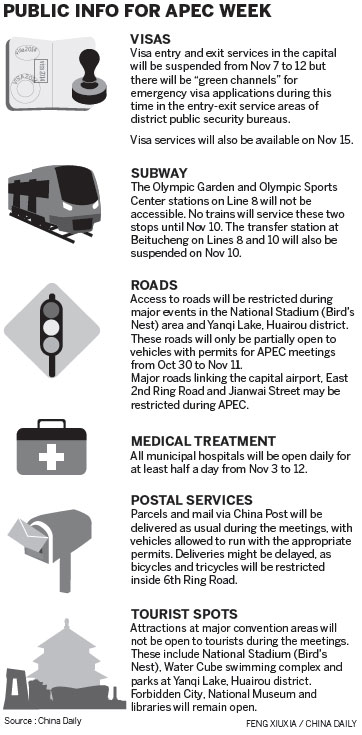Carpooling picks up again in capital
By Gao Bo (China Daily) Updated: 2014-11-04 07:51Carpooling has become a popular choice for Beijing's white-collar workers as the limit on the number of cars on roads during the APEC meeting took effect on Monday.
City residents can only drive their cars every other day under the odd-even license number restrictions.
Wang, a woman in her 30s who declined to give her full name, posted on a website on Sunday that she sought someone to carpool with on Tuesday and other even-numbered days during the APEC meeting period, from now till Nov 12.
The license plate on Wang's car ends with "1", so it is only allowed on the roads on days with an odd-numbered date. She wanted to find a car with an even plate number after the car restriction took effect on Monday.
No subway or bus goes directly from Wang's home to her office, about 35 kilometers away.
"I have no choice but carpooling, because the commute from my home to office may take three hours by subway and bus alternation, not to mention taxi, which is too expensive," Wang said.
She usually spends 10 yuan ($1.6) pooling in someone else's car - almost the same as the cost by subway and bus.
Wang has much carpooling experience.
"We usually negotiated the details in advance on the phone or by WeChat, so I never had arguments with car owners or passengers," Wang said.
"Sometimes I look on websites or by apps, and sometimes friends may introduce the car owners to me," she said.
Safety is the key issue for car sharers. Wang said she usually posts at reputable and popular websites that mainly serve youths, which she believes is more convenient and safer.
By Monday afternoon, Wang hadn't found someone to pick her up at the office on Tuesday.
Visitors can publish posts by themselves, but they should register first and offer some information.
More than 100 posts were published during the first half of Monday, most of them by car owners.
The website's staff will check the clients' phone number, e-mail address or ID card information, said Su Liangben, principal of the website.
The visitors on Monday in Beijing were expected to increase sharply, Su said.
Beijing lifted its ban on carpooling on Jan 1 in an attempt to ease traffic congestion and help tackle pollution, becoming the first Chinese city to legalize carpooling.
Previously in Beijing, carpooling involving money was banned. Drivers who accepted money from passengers could face heavy fines.
The Municipal Transport Commission also provided detailed definitions of two types of carpooling, depending on the frequency and distance of the shared journey. It suggested that passengers and drivers sign a mutual agreement on the expense, itinerary and who should be held responsible in the event of an accident.
Carpooling can reduce vehicle flow by about 10 percent, which can ease congestion, said Pu Fanqiang, CEO of VVpinche.com, which has developed an app to attract clients. Car owners or passengers can provide their requirements, and then the software can match this information and give suggestions on cost distribution.
During the APEC period, the website is offering credits and bonuses to recruit car owners. So far, more than 2,000 people have participated in the special offer, Pu said, adding that the carpooling market is growing and is good for drivers as well as the environment.
gaobo@chinadaily.com.cn

- Govt encourages people to work 4.5 days a week
- Action to be taken as HIV cases among students rise
- Debate grows over reproductive rights
- Country's first bishop ordained in 3 years
- China builds Tibetan Buddhism academy in Chengdu
- Authorities require reporting of HIV infections at schools
- Typhoon Soudelor kills 14 in East China
- Police crack down on overseas gambling site
- Debate over death penalty for child traffickers goes on
- Beijing to tighten mail security for war anniversary







